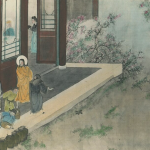UPDATE: This article has sparked tremendous outrage from readers. PLEASE NOTE. Save for a few editorial comments which are mine, this article is a re-posting of a blog by UND’s Dr. Darcia Narvaez, 2015 winner of the APA’s William James Award for research in the psychology of religion, morals and values. Her work represents the state-of-the-art of developmental moral psychology and this award puts in on the same level as Lawrence Kohlberg.
She isn’t saying that moms who can’t nurse for medical or emotional reasons are bad moms. She is saying that research supports the idea that nursing facilitates the growth of the structures in the “social brain” that are responsible for moral cognition. She unpacks this in her award winning book, Neurobiology and the Development of Human Morality. It is groundbreaking stuff and people–especially people who genuinely want to know what it takes to raise kids who are strong-enough to stand against the current cultural tides– should be aware of it.
It should go without saying that people are free to parent how they want. They don’t need my permission. Make your choices and be proud of them. I agree with what the article says, but readers are free to make up their own minds. Blessings.
————–ORIGINAL POST BELOW
Dr. Darcia Narvaez is a moral developmental psychologist at the Univ. of Notre Dame. Moral developmental psychologists study what goes into raising kids who are able to resist negative peer pressure and make good choices throughout their lives. As I argue in Beyond the Birds and the Bees: Raising Whole and Holy Kids, my book about what it takes to raise moral, godly kids, breastfeeding plays a special role in laying the foundation for moral reasoning in the infant and toddler’s brain.
Dr. Narvaez has a tremendous article at her Psychology Today blog, Moral Landscapes, addressing both why breastfeeding shouldn’t be optional in the first place and how long parents might want to nurse to give their children the full psychological, relational and moral benefits nursing can offer.
Here is a sample followed by a link to a terrific follow-up article where she responds to many objections and questions sent to her by readers. I guarantee you’ll want to read the whole thing.
Breastfeeding is optional for a mother these days. She can choose not to do it. And without social support and pressure to be a “true” feminist, this seems like the “right” thing to do. Baby will usually stay alive with infant formula (despite its many risks including that it is the only consistent link to SIDS).
Breastfeeding is not an option for a child who wants to grow optimally, and what baby does not want that?
The recent book, Lactivism (link is external), with sloppy reporting and by misreading the evidence, argues that breast milk makes no difference for the health of the child. It became very popular despite the inaccuracies(link is external). It’s astounding to anyone who knows anything about breast milk. Maureen Minchin has an excellent critique(link is external).
How is this determined? By experiment of course. Randomized, controlled trials are presumed to be the only source of “truth.” (Of course it’s experiment-focused scientists who want you to believe this.) Obviously evolutionary science is dismissed here.
Experiment-focused science assumes we cannot know anything until a “proper” experiment is done. We cannot rely on the natural world to be intelligent –only experimental scientists know anything for sure (tell that to our ancestors and the billions of other creatures that missed out on experimental science). So for child raising, anything goes until we have an experiment. Of course you cannot ethically do experiments on babies. So, anything goes. Whoever has a stronger soap box or microphone or make-my-life-easy story will win.
Getting Baselines Right
It’s amazing that people who think themselves so smart and superior to everyone else, can be so, shall we say, ignorant. They fail to understand other types of knowledge gathering, like observation. Or, how with evolutionary processes, the natural world has “done the experimenting” over eons and provided us with many adaptations that are very intelligent. Nature provides many baselines for making judgments.
Do we really have to take baby birds away from their nests and see what their parents do? (Ignore them). Or feed them some other food instead of the food their parents bring? (Which kills them.) See Derrick Jensen’s(link is external) forthcoming 2016 book, The Myth of Human Supremacy, for a scathing review of scientific arrogance and mistreatment of the natural world.
We have baselines for human nests too (see more below in footnote). And one of these is breastfeeding. Breastfeeding is what mammals do. Social mammals emerged more than 30 million years ago with extensive breastfeeding. Apes have on average four years of breastfeeding. Humans, as the most immature of apes at birth (25% of braindeveloped and more like a fetus in many ways), need the most intensive parenting for the longest duration to reach maturity (3 decades). This requires lots of good caregiving.
Subnote: Some people mistakenly think that relying on nature’s “experiments” is a “naturalistic fallacy.” A naturalistic fallacy is when a person takes a fact, something that “is,” and makes it a “should” (e.g., females bear babies so females should bear babies). Taking a bunch of facts together, converging evidence, is not the same thing as the so-called fact-value distinction as there are multiple points of evidence used to support the “should.”
Which brings us back to breastfeeding. Anthropologists have studied small-band hunter-gatherer communities around the world, the type of society in which the human genus spent 99% of its history (more below in footnote). They have noted the norms for early childhood. For breastfeeding, it’s 2-8 years, with an average weaning age of 4 years (Konner, 2005). Studies measuring only breastfeeding initiation (one attempt) or for 3 months of time are not going to provide the information needed for a true experiment (which, again, cannot be done—can you imagine randomly assigning mothers to children or assigning 8 years of breastfeeding?)
The average length for our ancestors (and small-band hunter-gatherers) is shocking for mothers in advanced nations where societies are built around work and workplaces and not families and child development.
But breastfeeding is what helped our ancestors survive, thrive and reproduce.
Misunderstanding breastfeeding
Breastfeeding is not just about food. Why might several years of breastfeeding matter? Just to mention one thing here (see the links below to much more information): breast milk provides all the immunoglobulins needed for immune system development, which takes around 5 years to develop.
But there are other misunderstandings. Breast milk has thousands of ingredients and these are tailored to the particular child at the time of breastfeeding. Yes! (See Katie Hinde’s blog, Mammals…Suck(link is external).) This is why doing experiments with pumped milk is not going to work. Or doing experiments at all. Every child is different, developing at their own pace. Every feeding is different. It’s an interaction between mom’s science-laboratory breasts and the child’s needs.
Myth of formula as “safe”
The safety of formula is often touted as “we have clean drinking water, unlike some other nations, so formula is safe.” Safe from what? Not SIDS. Formula is linked to all if not virtually all SIDs deaths…. READ THE REST HERE
And please be sure to read Dr. Narvaez’s response to critics here in To Doubters of the Importance of Breastfeeding.
The science is there for those who are willing to look at it. Breastfeeding is a moral issue. God gives moms breastmilk to hold in trust for their babies. Don’t take away your baby’s inheritance.













